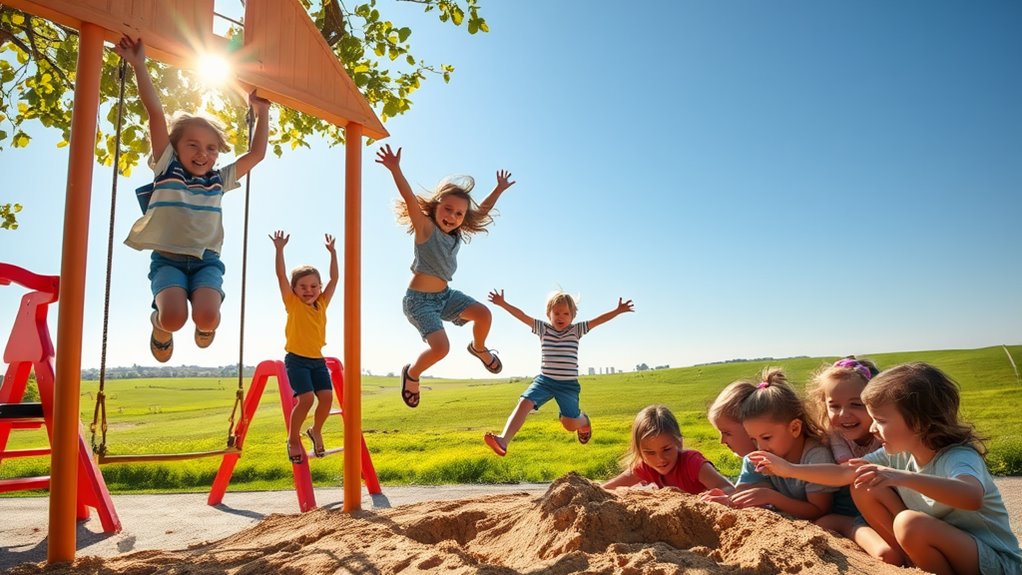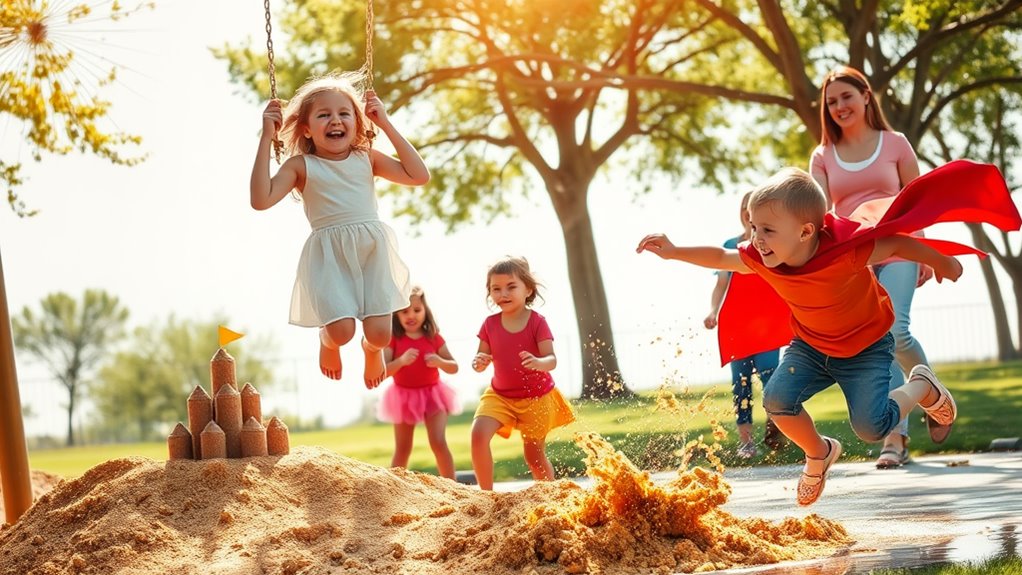Why Outdoor Play Is Critical for Healthy Development
Outdoor play is vital for your child’s healthy development, offering numerous benefits across physical, emotional, and cognitive areas. It enhances gross motor skills like running and climbing while improving coordination and balance. Beyond physical health, outdoor activities foster teamwork, empathy, and confidence, essential for emotional growth. Your child will also engage in critical thinking through exploration and nature-based learning, sparking creativity and problem-solving skills. Overall, outdoor play lays a foundation for holistic development, encouraging resilience and strong social connections. If you’re curious about specific activities to boost outdoor play, there’s so much more to discover.
Key Takeaways
- Outdoor play enhances gross motor skills, coordination, and balance, contributing to physical health and fitness in children.
- It fosters emotional and social development by promoting teamwork, empathy, and healthy relationships among peers.
- Engaging with nature sparks curiosity and cognitive growth, encouraging critical thinking and creative problem-solving.
- Outdoor play provides rich sensory experiences, aiding in neural connections and overall cognitive development.
- It instills resilience and confidence through safe risk-taking, preparing children for future challenges.
Importance of Outdoor Play
When it comes to child development, outdoor play is crucial. It provides kids with an opportunity to explore their environment, fostering a deep connection with nature. This connection isn’t just about enjoying the fresh air; it’s also about understanding the world around them. When children engage in outdoor activities, they learn to observe, interact with, and appreciate natural elements, helping to instill a sense of curiosity and respect for the environment.
Additionally, outdoor play encourages children to practice risk assessment. As they navigate different terrains, climb trees, or jump off small heights, they’re constantly evaluating their safety and making decisions. This kind of play is vital in helping them develop problem-solving skills and resilience. You might notice how kids learn to gauge their limits and understand consequences through these experiences.
Ultimately, outdoor play isn’t just about physical activity; it’s about holistic development. It supports emotional and social growth as children engage with peers, negotiate rules, and share experiences.
Physical Benefits for Children
Outdoor play offers numerous physical benefits for children that can significantly enhance their overall health. Engaging in activities outside helps develop gross motor skills, such as running, jumping, and climbing. These movements not only strengthen muscles but also improve coordination and balance. When kids play outdoors, they’re more likely to explore their environment, which encourages active movement and physical challenges.
Additionally, outdoor play provides rich sensory experiences. Children interact with various textures, sounds, and sights, stimulating their senses in ways that indoor play often can’t match. For instance, feeling the grass underfoot or listening to birds chirping enhances their sensory development, contributing to a better understanding of the world around them.
Moreover, outdoor play promotes cardiovascular health by increasing heart rates and improving endurance. As kids run around and engage in games, they’re also burning off energy, which can help maintain a healthy weight.
Emotional and Social Development
Engaging in outdoor play significantly boosts children’s emotional and social development. When kids play outside, they’re not just having fun; they’re also learning vital social skills and building emotional resilience. This type of play allows them to interact with others, negotiate rules, and resolve conflicts, all of which are essential for forming healthy relationships.
Here are a few ways outdoor play helps with emotional and social growth:
-
Encourages teamwork: Kids learn to work together, share responsibilities, and support each other in various activities.
-
Promotes empathy: Through group play, children start to understand others’ feelings, helping them develop compassion and kindness.
-
Increases confidence: Facing challenges in a safe environment boosts self-esteem and allows kids to take risks, leading to greater emotional strength.
In essence, outdoor play is a fantastic platform for kids to develop essential social skills and emotional resilience. When they engage with their peers in a natural setting, they not only enjoy the moment but also lay the foundation for their future interactions and emotional well-being.
Cognitive Growth Through Exploration
Exploring the outdoors sparks children’s curiosity and enhances their cognitive growth. When kids engage with nature, they’re not just playing; they’re participating in nature-based learning that encourages critical thinking and problem-solving skills.
As they navigate through different environments, they learn to assess risks, make decisions, and adapt to new situations.
Sensory experiences play a key role in this process. Whether it’s feeling the texture of bark, listening to the rustle of leaves, or observing the movements of insects, these interactions stimulate their senses and brains.
Each new sensation they encounter helps them build neural connections that are crucial for cognitive development.
Outdoor exploration also encourages creativity. When children invent games or create imaginary worlds, they’re using their imagination and developing their ability to think abstractly.
This kind of open-ended play nurtures their ability to innovate and find unique solutions to problems.
Encouraging Outdoor Activities
Creating opportunities for children to participate in outdoor activities is vital for fostering both their cognitive development and overall well-being. By encouraging outdoor play, you’re helping kids connect with their environment, develop physical skills, and boost their creativity.
Here are some great ways to promote outdoor activities:
-
Organize nature scavenger hunts: These fun adventures not only get kids moving but also teach them about the natural world. Kids can explore local parks or backyards, searching for specific plants, insects, or rocks.
-
Visit community playgrounds: These spaces are perfect for social interaction and physical challenges. Let your kids climb, slide, and swing while making new friends.
-
Plan family hikes: Exploring nearby trails or nature reserves can become a treasured family tradition. You’ll enjoy quality time together while promoting fitness and appreciation for nature.
Frequently Asked Questions
How Much Outdoor Playtime Do Children Need Daily?
Daily recommendations suggest kids should get at least one hour of outdoor playtime. Following playtime guidelines, this helps promote physical health, social skills, and emotional well-being, ensuring they thrive in their development and enjoy their childhood.
What Types of Outdoor Activities Are Most Beneficial?
You won’t believe how magical nature exploration can be! Team sports like soccer and basketball boost teamwork, while discovering hidden trails ignites curiosity. Both activities are like supercharged vitamins for your child’s healthy growth and happiness!
How Can Parents Ensure Outdoor Play Is Safe?
To ensure outdoor play’s safe, you should implement effective supervision strategies and practice risk management. Keep an eye on your child’s activities, choose safe play areas, and educate them about potential hazards they might encounter.
What Weather Conditions Are Suitable for Outdoor Play?
“April showers bring May flowers.” Sunny days are perfect for outdoor play, but don’t shy away from rainy play; just ensure kids have waterproof gear. Embrace all weather—it’s nature’s way of keeping adventures exciting!
How Can Schools Promote Outdoor Play for Students?
To promote outdoor play, you could advocate for innovative playground design that sparks creativity. Engaging community involvement through events or partnerships can also enhance outdoor experiences, making play more accessible and enjoyable for all students.





